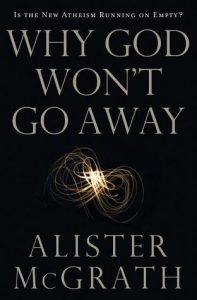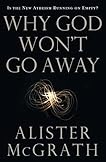 Summary from Goodreads: An accessible discourse written by a trusted expert and scholar critiquing the new atheism on its own merits and claims.
Summary from Goodreads: An accessible discourse written by a trusted expert and scholar critiquing the new atheism on its own merits and claims.- What is the new atheism
- The problem of religion
- The problem of human nature
- Believing only what can be proved
- Dealing with imagined worlds and myths
- The new humanism and the new enlightenment
- Violence and dogmatism
 Why God Won’t Go Away: Is the New Atheism Running on Empty? by Alister E. McGrath
Why God Won’t Go Away: Is the New Atheism Running on Empty? by Alister E. McGrath
My rating: 5 of 5 stars
When I began this book, I had not even heard of the “new atheist” movement. I knew what an atheist was, but I was not aware of the new direction it had taken. I was amazed at how brazen this movement had become and how hostile to religion it is. I am only familiar with tolerant atheists, and this book showed me that new atheism has gone far beyond that. It is kind of funny that new atheism, in a way, has become a religion or a church group in itself. The very thing they are fighting against is what they have become. Which is why new atheism is not the tour de force it once was.
My favorite section of the book was the section that dealt with science. I really did a lot of thinking about science’s role in our everyday lives here on earth. Science answers questions like: How did we get here? and the like. What science does not answer is: Why are we here? I think that when the author pointed out that not everything can be answered by reason, he really struck a chord with me.
I appreciated the way in which the author wrote. His style is academic but quite understandable. I suppose that if you are not a theology student, you might struggle to understand some of what he says, but thankfully he deals with the topic in a simple and abbreviated way. His sense of humor often came out at just the right time, which was a nice change. Some theologians don’t understand what humor is.
I would recommend this book to anyone who may be dealing with an atheist–new or not. This is one I plan to keep in my library for a long time to come!
I received this book free from the publisher through the BookSneeze®.com book review bloggers program. I was not required to write a positive review. The opinions I have expressed are my own. I am disclosing this in accordance with the Federal Trade Commission’s 16 CFR, Part 255 : “Guides Concerning the Use of Endorsements and Testimonials in Advertising.”
Alister McGrath was born in Belfast, Northern Ireland, in 1953. He grew up in Downpatrick, Co. Down, where he attended Down High School. In September 1966 he became a pupil at the Methodist College, Belfast, majoring in pure and applied mathematics, physics and chemistry. He was elected to an open major scholarship at Wadham College, Oxford University, to study chemistry from October 1971, where his tutors included Jeremy R. Knowles and R. J. P. Williams. He gained first class honours in chemistry in June 1975, and began research in molecular biophysics in the Oxford University Department of Biochemistry under the supervision of Professor Sir George K. Radda, FRS, who is presently head of the Department of Physiology, Anatomy and Genetics at Oxford University. He was elected to an E.P.A. Cephalosporin Research Studentship at Linacre College, Oxford, for the academic year 1975-6, and to a Domus Senior Scholarship at Merton College,Oxford, for the period 1976-8. He also spent three months as a European Molecular Biology Organization visiting fellow at the University of Utrecht, in the Netherlands. During the years 1975-8, he carried out scientific research, leading to the publication of a number of peer-reviewed research articles, alongside studying for the Oxford University Final Honour School of Theology. In December 1977, he was awarded an Oxford D.Phil. for his research in the natural sciences, and he gained first class honours in Theology in June 1978. The interaction of Christian theology and the natural sciences has subsequently been a major theme of his research work, and is best seen in the three volumes of his Scientific Theology (2001-3).
McGrath left Oxford to work at Cambridge University, having been elected to the Naden Studentship in Divinity at St John’s College, Cambridge (1978-80). He also studied at the same time for ordination in the Church of England at Westcott House, Cambridge. In September 1980, he was ordained deacon, and began work as a curate at St Leonard’s Parish Church, Wollaton, Nottingham, in the English east midlands. He was ordained priest at Southwell Minster in September 1981. In 1983, he was appointed lecturer in Christian doctrine and ethics at Wycliffe Hall, Oxford, and a member of the Oxford University Faculty of Theology. McGrath spent the fall semester of 1990 as the Ezra Squire Tipple Visiting Professor of Historical Theology at theTheological School, Drew University, Madison, New Jersey. He gave the Bampton Lectures at Oxford University in 1990, in which he explored the factors which lead to the origins of doctrinal statements in Christianity.
McGrath was elected University Research Lecturer in Theology at Oxford University in 1993, and also served concurrently as research professor of theology at Regent College, Vancouver, from 1993-7. In 1995, he was elected Principal of Wycliffe Hall, and in 1999 was awarded a personal chair in theology at Oxford University, with the title of “Professor of Historical Theology”. He earned an Oxford Doctorate of Divinity in 2001 for his research on historical and systematic theology. In September 2004, he resigned as Principal of Wycliffe Hall to become the first Director of the newly-established Oxford Centre for Christian Apologetics. In October 2006, he was elected to a Senior Research Fellowship at Harris Manchester College, Oxford, where he began directing a major new research project on natural theology, funded by the John Templeton Foundation. He was elected a Fellow of the Royal Society of Arts in 2005.
In September 2008, McGrath took up the newly-established Chair of Theology, Ministry and Education in the Department of Education and Professional Studies at King’s College, London. He also served as the academic leader of the Centre for Theology, Religion and Culture, and was involved both in theological research and the professional development of clergy from a range of Christian denominations.
In 2013, McGrath accepted the Andreas Idreos Professorship in Science and Religion at the University of Oxford. He took up the new post on 1 April 2014.
As a former atheist, McGrath is respectful yet critical of the movement. In recent years, he has been especially interested in the emergence of “scientific atheism”, and has researched the distinctive approach to atheist apologetics found in the writings of the Oxford zoologist and scientific populariser Richard Dawkins. He regularly engages in debate and dialogue with leading atheists, and is presently researching the iconic role played by Charles Darwin in atheist apologetics, and the appeal to the controversial and problematic concept of the “meme” in recent atheist accounts of the origins of belief in God.
His main research interest at present is the area of thought traditionally known as “natural theology”, which is experiencing significant renewal and revitalization at the moment. He addressed this theme in detail at his Richardson Lectures at the University of Newcastle-upon Tyne (2008), his Gifford Lectures at the University of Abedeen (2009), and his Hulsean Lectures at the University of Cambridge. The Richardson Lectures have been published as The Open Secret: A New Vision for Natural Theology (Blackwells). His Gifford Lectures were published as A Fine Tuned Universe: The Quest for God in Science and Theology. His Hulsean Lectures has been published by Wiley-Blackwell, entitled “Darwinism and the Divine: Evolutionary Thought and Natural Theology”.



